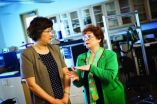Portable brain-mapping device allows UT Arlington researchers to 'see' where memory fails
Students veterans improve after treatment
2014-06-19
(Press-News.org) UT Arlington researchers have successfully used a portable brain-mapping device to show limited prefrontal cortex activity among student veterans with Post Traumatic Stress Disorder when they were asked to recall information from simple memorization tasks.
The study by bioengineering professor Hanli Liu and Alexa Smith-Osborne, an associate professor of social work, and two other collaborators was published in the May 2014 edition of NeuroImage: Clinical. The team used functional near infrared spectroscopy to map brain activity responses during cognitive activities related to digit learning and memory retrial.
Smith-Osborne has used the findings to guide treatment recommendations for some veterans through her work as principal investigator for UT Arlington's Student Veteran Project, which offers free services to veterans who are undergraduates or who are considering returning to college.
"When we retest those student veterans after we've provided therapy and interventions, they've shown marked improvement," Smith-Osborne said. "The fNIRS data have shown improvement in brain functions and responses after the student veterans have undergone treatment."
Liu said this type of brain imaging allows us to "see" which brain region or regions fail to memorize or recall learned knowledge in student veterans with PTSD.
"It also shows how PTSD can affect the way we learn and our ability to recall information, so this new way of brain imaging advances our understanding of PTSD." Liu said.
This study is multi-disciplinary, associating objective brain imaging with neurological disorders and social work.
While UT Arlington bioengineering faculty associate Fenghua Tian is the primary author assisted by bioengineering graduate research assistant Amarnath Yennu, collaborators of the study include UT Austin psychology professor Francisco Gonzalez-Lima and psychology professor Carol North with UT Southwestern Medical Center and the Veterans Administration North Texas Health Care System.
Khosrow Behbehani, dean of the UT Arlington College of Engineering, said this collaborative research is "allowing the researchers to objectively measure the changes in the level of oxygen in the brain and relate them to some of the brain functions that may have been adversely affected by trauma or stress."
Numerous neuropsychological studies have linked learning dysfunctions – such as memory loss, attention deficits and learning disabilities – with PTSD.
The new study involved 16 combat veterans previously diagnosed with PTSD who were experiencing distress and functional impairment affecting cognitive and related academic performance. The veterans were directed to perform a series of number-ordering tasks on a computer while researchers monitored their brain activity through near infrared spectroscopy, a noninvasive neuroimaging technology.
The research found that participants with PTSD experienced significant difficulty recalling the given digits compared with a control group. This deficiency is closely associated with dysfunction of a portion in the right frontal cortex. The team also determined that near infrared spectroscopy was an effective tool for measuring cognitive dysfunction associated with PTSD.
With that information, Smith-Osborne said mental healthcare providers could customize a treatment plan best suited for that individual.
"It's not a one-size-fits-all treatment plan but a concentrated effort to tailor the treatment based on where that person is on the learning scale," Smith-Osborne said.
Smith-Osborne and Liu hope that their research results lead to better and more comprehensive care for veterans and a better college education.INFORMATION:
The work was supported in part by the Hogg Foundation for Mental Health, The National Institutes of Health's National Institute of Neurological Disorders and Stroke, the UT Arlington Research Enhancement fund, the Department of Education, the Dallas Foundation and private donors in support of the Student Veteran Project.
About UT Arlington
The University of Texas at Arlington is a comprehensive research institution and the second largest institution in The University of Texas System. The Chronicle of Higher Education ranked UT Arlington as the seventh fastest-growing public research university in 2013. U.S. News & World Report ranks UT Arlington fifth in the nation for undergraduate diversity. Visit http://www.uta.edu to learn more. Follow #UTAdna on Twitter. END
ELSE PRESS RELEASES FROM THIS DATE:
Group doctor visits may improve life for people with muscle disorders
2014-06-18
MINNEAPOLIS – A new study suggests that people with muscle diseases such as muscular dystrophies may benefit more from group doctor visits than individual appointments. The study is published in the June 18, 2014, online issue of Neurology®, the medical journal of the American Academy of Neurology.
"In this age when the demand for neurologists is rising faster than the supply and health care costs continue to rise, it's important to look for finding solutions that are both effective and efficient," said study author Femke M. Seesing, MSc, of Radboud University Medical ...
Depression linked to higher heart disease death risk in younger women
2014-06-18
Women 55 and younger are twice as likely to suffer a heart attack, die or require artery-opening procedures if they're moderately or severely depressed, according to new research in the Journal of the American Heart Association.
"Women in this age group are also more likely to have depression, so this may be one of the 'hidden' risk factors that can help explain why women die at a disproportionately higher rate than men after a heart attack," said Amit Shah, M.D., M.S.C.R., study author and assistant professor of Epidemiology at Emory University in Atlanta, Ga.
Investigators ...
Racial disparities in sentinel lymph node biopsy in women with breast cancer
2014-06-18
The use of sentinel lymph node biopsy (SLNB) to stage early breast cancer increased in both black and white women from 2002 to 2007, but the rates remained lower in black than white patients, a disparity that contributed to disparities in the risk for lymphedema (arm swelling common after breast cancer treatment because of damage to the lymphatic system).
SLNB was developed to replace axillary (arm pit) lymph node dissection (ALND) for staging early breast cancer to minimize complications. SLNB can often provide patients with a much more limited surgery. Racial ...
Parents of children with autism curtail reproduction after signs of disorder
2014-06-18
Parents of children with autism spectrum disorder (ASD) appear to curtail attempts to have more children after the first signs of the disorder manifest or a diagnosis is made.
ASD is a complex neurodevelopmental disorder. Few studies have focused on reproductive stoppage by parents after a child is diagnosed with ASD or symptoms appear.
Authors identified patients with ASD born from 1990 through 2003 in California. A total of 19,710 families in which the first birth occurred during the study period were identified. The families included 39,361 individuals (siblings ...
Families with an autistic child are a third less likely to have more kids
2014-06-18
Parents who have a child with autism spectrum disorder (ASD) are about one third less likely to have more children than families without an affected child, according to a study led by a UC San Francisco researcher.
The findings, which appear in the June 18 issue of JAMA Psychiatry, stem from the largest study of its kind on further child-bearing after a child has been diagnosed with the disorder. These are the first data to indicate that this is a reproductive decision. " While it has been postulated that parents who have a child with ASD may be reluctant to have more ...
Study finds difference in way bipolar disorder affects brains of children versus adults
2014-06-18
PROVIDENCE, R.I. – A new study from Bradley Hospital has found that bipolar children have greater activation in the right amygdala – a brain region very important for emotional reaction – than bipolar adults when viewing emotional faces. The study, now published online in JAMA Psychiatry, suggests that bipolar children might benefit from treatments that target emotional face identification, such as computer based "brain games" or group and individual therapy.
This study is the first ever meta-analysis to directly compare brain changes in bipolar children to bipolar adults, ...
Making smartphones smarter with see-through sensors
2014-06-18
WASHINGTON, June 18, 2014—Your smartphone's display glass could soon be more than just a pretty face, thanks to new technology developed by researchers from Montreal and the New York-based company Corning Incorporated. The team has created the first laser-written light-guiding systems that are efficient enough to be developed for commercial use. They describe their work in a paper published today in The Optical Society's (OSA) open-access journal, Optics Express.
This revolutionary work could open up new real estate in the phone by embedding the glass with layer upon ...
Combatting cuckoos
2014-06-18
How do animals use their distinctive patterning to recognize each other? For some birds, recognizing one's own eggs can be a matter of life or death. In a new study, researchers from Harvard University and the University of Cambridge show that many birds parasitized by the Common Cuckoo have evolved distinctive pattern signatures on their eggs in order to distinguish them from those laid by a cuckoo cheat. The study reveals that these signatures provide a powerful defense against cuckoo trickery, helping host birds to reject cuckoo eggs before they hatch and destroy the ...
Columbia Engineering team finds thousands of secret keys in Android apps
2014-06-18
New York, NY—June 18, 2014—In a paper presented—and awarded the prestigious Ken Sevcik Outstanding Student Paper Award—at the ACM SIGMETRICS conference on June 18, Jason Nieh, professor of computer science at Columbia Engineering, and PhD candidate Nicolas Viennot reported that they have discovered a crucial security problem in Google Play, the official Android app store where millions of users of Android, the most popular mobile platform, get their apps.
"Google Play has more than one million apps and over 50 billion app downloads, but no one reviews what gets put into ...
New manufacturing methods needed for 'soft' machines, robots
2014-06-18
WEST LAFAYETTE, Ind. — Researchers have developed a technique that might be used to produce "soft machines" made of elastic materials and liquid metals for potential applications in robotics, medical devices and consumer electronics.
Such an elastic technology could make possible robots that have sensory skin and stretchable garments that people might wear to interact with computers or for therapeutic purposes.
However, new manufacturing techniques must be developed before soft machines become commercially practical, said Rebecca Kramer, an assistant professor of mechanical ...
LAST 30 PRESS RELEASES:
Cal Poly’s fifth Climate Solutions Now conference to take place Feb. 23-27
Mask-wearing during COVID-19 linked to reduced air pollution–triggered heart attack risk in Japan
Achieving cross-coupling reactions of fatty amide reduction radicals via iridium-photorelay catalysis and other strategies
Shorter may be sweeter: Study finds 15-second health ads can curb junk food cravings
Family relationships identified in Stone Age graves on Gotland
Effectiveness of exercise to ease osteoarthritis symptoms likely minimal and transient
Cost of copper must rise double to meet basic copper needs
A gel for wounds that won’t heal
Iron, carbon, and the art of toxic cleanup
Organic soil amendments work together to help sandy soils hold water longer, study finds
Hidden carbon in mangrove soils may play a larger role in climate regulation than previously thought
Weight-loss wonder pills prompt scrutiny of key ingredient
Nonprofit leader Diane Dodge to receive 2026 Penn Nursing Renfield Foundation Award for Global Women’s Health
Maternal smoking during pregnancy may be linked to higher blood pressure in children, NIH study finds
New Lund model aims to shorten the path to life-saving cell and gene therapies
Researchers create ultra-stretchable, liquid-repellent materials via laser ablation
Combining AI with OCT shows potential for detecting lipid-rich plaques in coronary arteries
SeaCast revolutionizes Mediterranean Sea forecasting with AI-powered speed and accuracy
JMIR Publications’ JMIR Bioinformatics and Biotechnology invites submissions on Bridging Data, AI, and Innovation to Transform Health
Honey bees navigate more precisely than previously thought
Air pollution may directly contribute to Alzheimer’s disease
Study finds early imaging after pediatric UTIs may do more harm than good
UC San Diego Health joins national research for maternal-fetal care
New biomarker predicts chemotherapy response in triple-negative breast cancer
Treatment algorithms featured in Brain Trauma Foundation’s update of guidelines for care of patients with penetrating traumatic brain injury
Over 40% of musicians experience tinnitus; hearing loss and hyperacusis also significantly elevated
Artificial intelligence predicts colorectal cancer risk in ulcerative colitis patients
Mayo Clinic installs first magnetic nanoparticle hyperthermia system for cancer research in the US
Calibr-Skaggs and Kainomyx launch collaboration to pioneer novel malaria treatments
JAX-NYSCF Collaborative and GSK announce collaboration to advance translational models for neurodegenerative disease research
[Press-News.org] Portable brain-mapping device allows UT Arlington researchers to 'see' where memory failsStudents veterans improve after treatment



